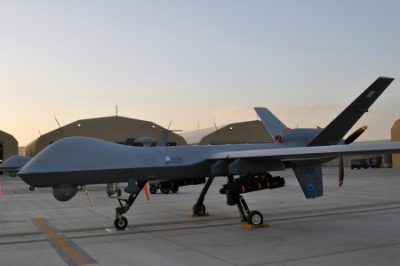Perpetual War: UK’s Armed Drones to Stay Deployed Beyond Campaign Against ISIS

A Ministry of Defence press conference has revealed that as the war against ISIS ends, British Reaper drones are to stay deployed in the Middle East after other UK aircraft return home. As The Times reported
‘Air Commodore Johnny Stringer, who led the British air campaign against the terrorist group until last month, said that drones and other surveillance aircraft would continue to fly over Iraq and Syria to help local forces guard against the militants returning.,
RAF Typhoon and Tornado’s, currently based at RAF Akrotiri in Cyprus, will begin returning home “in the next six and probably even in the next four months or so,” he stated.
Over the past three years, ISIS has been defending the territory it gained in a rapid armed advance in 2014. With the assistance of international coalition air strikes, the overwhelming majority of Iraqi territory as now been recovered by Iraqi forces. At some point, likely to be in the very near future, Iraqi Prime Minister Haider al-Abadi will declare that the war is over. While ISIS will likely morph into an insurgency campaign – and there are likely to be terror attacks in Iraqi cities – there will no longer be the ‘protracted armed violence’ of a level to mark an non-international armed conflict.
Given this, UK Reaper drones should be returning home alongside the UK’s other armed aircraft, the Tornados and Typhoons. However, as we have argued for a long time, the danger of drones is that it makes it much easier for nations to engage in – and continue to engage in – armed conflict.
There will no doubt be many arguing that it is sensible and pragmatic for the UK’s Reaper drones to continue to be deployed. They will argue that it is wasteful to not have Reaper’s capabilities available, given the on-going threats. It will be sensible, they will argue, for Reapers to continue to be based overseas, as the pilots can at least fly the minimum hours they need to be certified. And, they will no doubt argue, that’s the beauty of remote, unmanned systems. The deployment is not too onerous in terms of personnel as it’s just a small joint US-UK launch and recover element, while the mission planning, mission flying, and intelligence processing, exploitation and dissemination are all done remotely from the UK and the US.
But despite all these ‘pragmatic’ reasons, the impact of continuing to deploy armed Reapers will be damaging. Wars must come to an end. We should resist the idea that armed conflict is a perpetual state of being.
And the ongoing drone deployment by the UK will no doubt not be viewed as pragmatic or sensible by the majority in the Middle East, but as provocative and threatening. It will be seen that the UK is continuing to partner with the US in an endless drone war in the Middle East and beyond.
Britain’s armed Reaper drones have been deployed continuously now for more than a decade. Rather than join the US in its perpetual ‘war against terror’, its time to bring the drones home.
Featured image is from the author.

